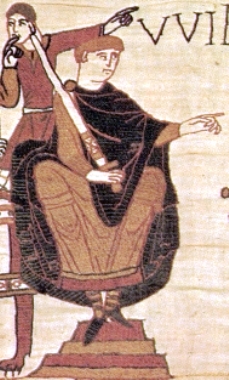- William (name)
Infobox Given Name Revised
name = William
imagesize=200px
caption=William the Conqueror , The Duke of Normandy in theBayeux Tapestry . The name William became very popular in the English language after theNorman Conquest of 1066 by William the Conqueror.
pronunciation = wiljəm
gender = Male
meaning = "will + helmet (protection)"
region = Germanic
origin = German
nickname =Will ,Bill ,Billy ,Willy ,Willie ,Liam ,Willem
related names =Wilhelm ,Guillermo
wiktionary entry = William
popularity = popularity
articles = WilliamWilliam is a popular proper name of old Germanic origin.Hanks, Hardcastle and Hodges, "Oxford Dictionary of First Names",
Oxford University Press , 2nd edition, ISBN 978-0-19-861060-1, p.276.] It became very popular in theEnglish language after theNorman Conquest of 1066, and remained so throughout the Middle Ages and into the modern era. The modern German equivalent is "Wilhelm ." It is sometimes abbreviated "Wm." The name's shortened familiar version in English is "Bill", "Billy", "Will" or "Willie".Origins
"William" is from the
Norman language (although Norman French was Latin-based and the proper name is Germanic) and is a cognate from the German "Wilhelm", and of Germanic origin: "wil" = "will or desire"; "helm";"helmet, protection"; thus theOld German name Wilhelm and the Old Norse name Vilhjálmr have the same roots. TheBelgian name "Guildhelm" means "harnessed with a gilded helmet".English history
The English "William" is taken from the
Anglo-Norman language and was transmitted to England after the Norman Conquest in the 11th century, and soon became the most popular name in England, along with other Norman names such asRobert (the English cognate was Hrēodbēorht [www.geocities.com/edgarbook/names/r/robert.html] ),Richard ,Roger (the English cognate wasHroðgar [ [http://www.behindthename.com/name/roger Behind the Name: Meaning, Origin and History of the Name Roger ] ] ), andHugh (all of Germanic origin, transmitted through the Normans' use ofOld French ). The name was so popular, in fact, that history records an event in Normandy in 1171 whereHenry the Young King held court forChristmas which included 110 knights named "William"-- the Williams had gathered in a room and refused to allow any one to eat with them, unless they were named William.During the Middle Ages the word "cock" was used to describe a self-assured young man (taken after the image of a strutting self-assured rooster). As a result this nickname was applied to a number of names, including William which is where the name Wilcox comes from.
The name Wilkin is also of medieval origin taken from the shortened version of William (Will) with the suffix "kin" added. Kin means small or little, thus Wilkin means "Little William".
In the 16th century during the
Reformation ,Protestant s abandoned the usage of Catholic names such as William, instead using Biblical names.According to the 1990 U.S. Census the name William was the 5th most popular first name with 2.451% of the male population (around three million), and the last name Williams was the 3rd most common last name with 0.699% of the population (around 1,747,500 people).
Name variants
Alternate forms include:
*Wilhelm (German, Polish)
*Willem, Wim (Dutch, Low German)
*Jelle (Frisian)
*Wiremu (Maori)
*威廉 - Wēi Lián (Chinese)
*ウィリアム - Wiriamu (Japanese)
*Gulielmus (Latin)
*Guglielmo (Italian)
*Guillaume (French)
*Guildhelm (Old Dutch )
*Guilhem (Occitan)
*Guillem (Catalan)
*Guillén (Aragonese)
*Guillermo (Spanish)
*Guilherme (Portuguese)
*Guillerme (Galician)
*Gwilym (Welsh)
*Gwilherm (Breton)
*Illiam (Manx Gaelic)
*Melhem (Arabic )
*Uilleam (Scots Gaelic)
*Uilliam (Irish Gaelic)
*װֶעלװֶעל - Velvel (Yiddish)
*Villem (Estonian)
*Вильгельм - Vil'gel'm (Russian)
*Vilhelm (Danish, Norwegian, Swedish)
*Vilhelmo (Esperanto)
*Viliam (Slovak)
*Viljem (Slovene)
*ויליאם - Vylyam (Hebrew)
*Вилим - Vilim (Serbian)
*Vilém (Czech)
*Vilmos (Hungarian)
*Vilhelms (Latvian)
*Vilius, Viliumas (Lithuanian)
*Viljami, Ville (Finnish)
*Vilhjálmur (Icelandic)
*Vilhjálmr (Old Norse)
*Γουλιέλμος - Gouliélmos (Greek)References
Wikimedia Foundation. 2010.
